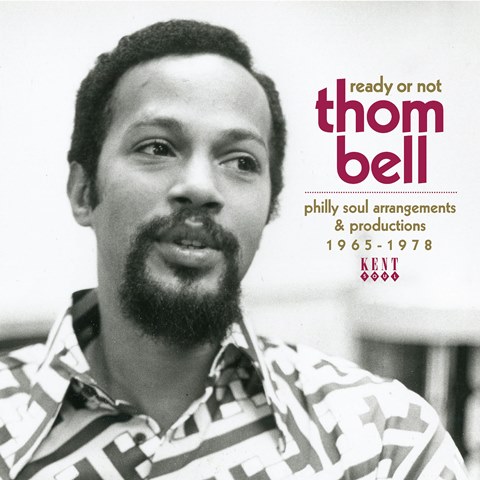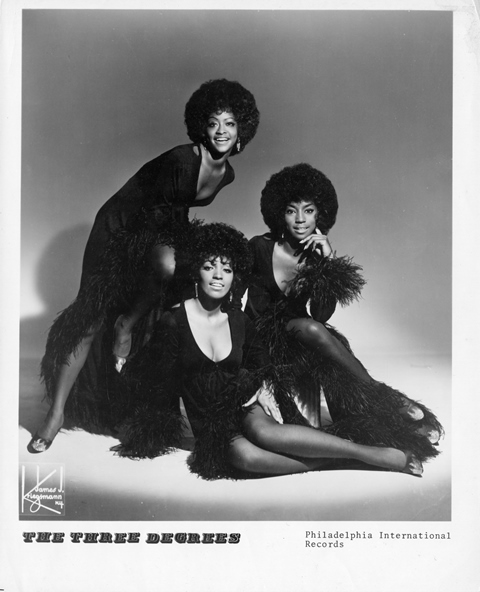A skim though the track listing confirms that this is no typical soul compilation. Actress and some-time pop singer Connie Stevens crops up. So does Johnny Mathis. Such seeming quirks are fitting as Thom Bell was never a typical arranger, producer or songwriter. There’s much more to the story than the timeless O’Jays and Stylistics hits he created for Gamble and Huff’s label Philadelphia International Records.
Ready Or Not – Thom Bell's Philly Soul Arrangements & Productions 1965–1978 collects 23 tracks which Bell arranged, produced or wrote, or any combination first two and the last. The earliest cut is The Orlons’ “I Can't Take it”, a 1965 single. The latest is “Close the Door”, a 1978 Teddy Pendergrass single. Surprisingly, Ready Or Not is the first compilation focussing on Bell. As such an overview has been lacking, this is a significant release.
 Although retired, Bell has been interviewed for the booklet’s essay and track-by-track commentary and it’s apparent he did it his way all along. He was never an employee of Philadelphia International or a partner in the business. As it’s noted, “he steered clear of tying himself to one label.” Freedom was an overriding concern.
Although retired, Bell has been interviewed for the booklet’s essay and track-by-track commentary and it’s apparent he did it his way all along. He was never an employee of Philadelphia International or a partner in the business. As it’s noted, “he steered clear of tying himself to one label.” Freedom was an overriding concern.
His musical outlook evolved from being classically schooled on drums, flugelhorn and piano, all of which he could play by age nine. The first pop record he heard was Little Anthony & The Imperials’ “Tears on my Pillow”, a US hit in 1958. But it was a later Little Anthony single, 1964’s “I'm on the Outside (Looking in)”, which floored him. Of the record’s producer and writer, he says “Teddy Randazzo…was my leader. Randazzo and Bacharach, those were my leaders. They tuned me in to what I was listening to in a more modernistic way, a way that I wanted to do. And I took it from there.” Four years after debuting on record with Gamble in 1961 as half of Kenny and Tommy, Bell had found his path.
By combining autonomy, his background in classical music and a leaning towards baroque but not florid arrangements and songwriting, Bell became a sonic auteur as significant as Randazzo. While the latter traded in an instantly recognisable drama, Bell was, as he says, evolving “a more classical modus operandi. That’s what I’ve done all my life. I couldn’t take three chords. I knew there was something better than that.” His records were glistening and sumptuous. Timpani and violins featured. Harpsichords and zithers crop up. French horns, trombones and wind chimes too. All were employed to enhance the dynamics of a recording. But nothing in the architecture of Bell’s sound-world was cluttered.
 In 1965, with The Orlons’ swooning “I Can't Take it” he already had it nailed. The lead voice soars over moody wordless backing vocals while brass intermingles with the singing as if it’s another member of the chorale. The Little Anthony/Randazzo influence is apparent – as it is on the next cut, the fantastic 1967 Delfonics’ single “You've Been Untrue”. Other gems include the soaring Leslie Gore-esque 1970 Connie Stevens’ B-side “Tick-Tock”, Gore’s own 1968 single “Look the Other Way” (different in approach and style, but shoulder-to-shoulder with what The Supremes were releasing in this period) and the startling, epic album version of “Life is a Song Worth Singing” by Johnny Mathis (1973).
In 1965, with The Orlons’ swooning “I Can't Take it” he already had it nailed. The lead voice soars over moody wordless backing vocals while brass intermingles with the singing as if it’s another member of the chorale. The Little Anthony/Randazzo influence is apparent – as it is on the next cut, the fantastic 1967 Delfonics’ single “You've Been Untrue”. Other gems include the soaring Leslie Gore-esque 1970 Connie Stevens’ B-side “Tick-Tock”, Gore’s own 1968 single “Look the Other Way” (different in approach and style, but shoulder-to-shoulder with what The Supremes were releasing in this period) and the startling, epic album version of “Life is a Song Worth Singing” by Johnny Mathis (1973).
Hits are here too: Back Stabbers (The O'Jays, 1972); Here I go Again (Archie Bell & The Drells, 1969); It's Gonna Take a Miracle (Laura Nyro & Labelle, 1971); Ready or Not Here I Come (Can't Hide From Love) (The Delfonics, 1967); You Make me Feel Brand New (The Stylistics, 1973, the album version). However, complementing these with the unfamiliar makes the (obvious) case that Bell is an American great.
If any convincing is needed head to 1970 and Three Degrees’ “What I See”, where complex vocal acrobatics deftly intertwine with tricksy instrumentation. The arrangement is so assured the kinetic, immediate performance is not impeded by what could be overload. Then there’s Ronnie Dyson’s “One Man Band (Plays All Alone)” (1973), yet another stop-in-your-tracks performance. The only genuine question with Ready Or Not – Thom Bell's Philly Soul Arrangements & Productions 1965–1978 is why it’s taken so long for this tribute to arrive.
- Next Week: This Is Our Music – Norwegian jazz gets a once-over
- More reissue reviews on theartsdesk
- Kieron Tyler’s website















Add comment